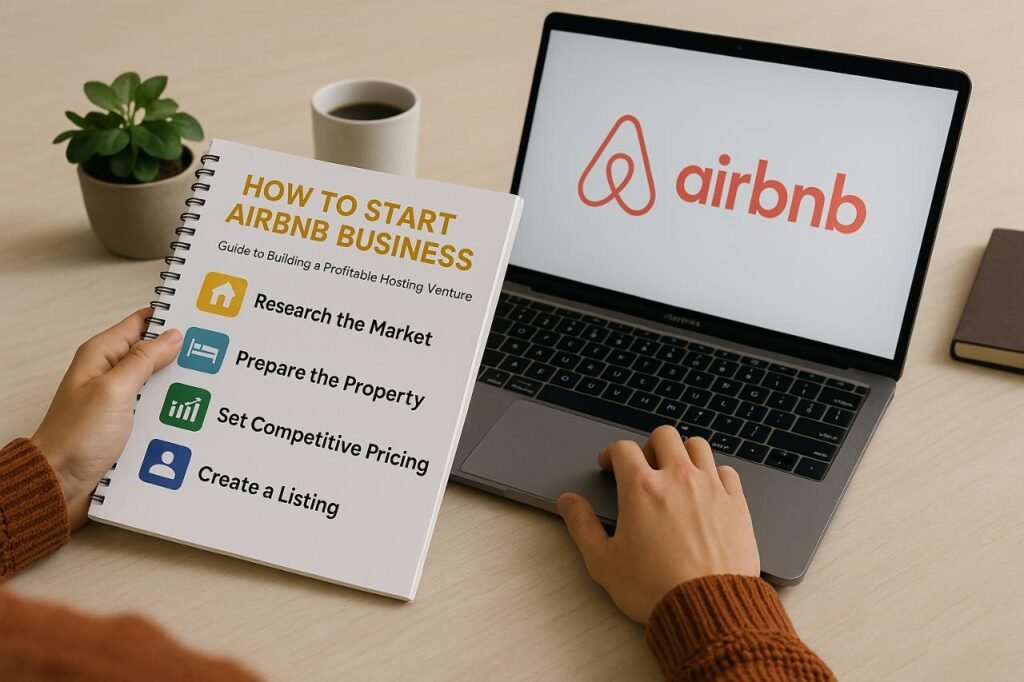Starting an Airbnb business offers one of the most flexible and rewarding paths to financial freedom in today’s sharing economy. Whether you’re renting out a spare room, managing multiple short-term rentals, or transforming properties into full-fledged hospitality ventures, understanding the complete process is essential. This guide provides a step-by-step roadmap to launching, managing, and scaling a successful Airbnb business from market research to guest management, pricing, and legal compliance
Conduct Market Research for Airbnb Profitability
The first step in starting an Airbnb business is understanding your local market and identifying demand patterns. Researching the area where you plan to host helps you determine average nightly rates, occupancy levels, and the type of travelers your region attracts. This foundational analysis ensures your investment decisions are based on data rather than guesswork.
To begin, evaluate local tourism data, competitor listings, and rental performance trends. Tools like AirDNA, Mashvisor, or PriceLabs can provide insights into revenue potential and average daily rates. Look at property types performing best, whether studios, shared apartments, or entire homes, and compare them against your target investment capacity.
Market research also involves assessing seasonality and regulations. In many cities, Airbnb regulations limit the number of days a property can be rented. Understanding zoning laws, licensing requirements, and local taxes prevents legal complications later. A clear market understanding leads to a more sustainable and profitable Airbnb business model.
Analyze Local Demand and Competition
Investigate short-term rental demand by examining travel statistics, event calendars, and business hubs in your area. Compare competitor amenities, pricing structures, and reviews to find opportunities for differentiation.
Identify the Most Profitable Property Types
Determine which property formats perform best. In tourist-heavy areas, entire homes might dominate; in business districts, compact studios could yield higher returns. Align your investment with target guest demographics.
Choose the Right Airbnb Business Model
Selecting the right business model determines how you’ll generate income. Airbnb hosts generally choose between owning property, renting and subleasing with permission (rental arbitrage), or managing properties for other owners.
Ownership-based models offer long-term equity and control. Rental arbitrage allows lower initial investment but requires strong landlord agreements. Property management, on the other hand, focuses on operational expertise and commission-based income.
Each model comes with different legal and financial implications. Before committing, calculate upfront costs, expected revenue, and break-even periods. Your model should align with your budget, local laws, and long-term goals.
Understand Ownership vs. Rental Arbitrage
Owning gives autonomy and asset appreciation, while arbitrage provides quicker scalability. Evaluate maintenance costs, mortgage rates, and licensing implications for each.
Explore Co-Hosting and Property Management
If you prefer less financial risk, co-hosting or property management can provide recurring income. You’ll earn commissions by optimizing listings and managing guest experiences for property owners.
Secure and Prepare Your Property for Guests
Once your business model is clear, it’s time to acquire or prepare your property. A well-maintained and appealing space directly influences guest satisfaction and ratings. Prioritize comfort, cleanliness, and modern amenities that enhance the overall stay.
Start by ensuring the property meets all safety standards. Install smoke detectors, fire extinguishers, first aid kits, and security locks. Comply with local building codes and accessibility guidelines. Then, focus on furnishing by choosing neutral decor, quality bedding, functional furniture, and reliable appliances.
To stand out, consider adding smart home features like keyless entry, thermostats, or entertainment systems. Personal touches like local art or welcome kits can further elevate the guest experience.
Focus on Interior Design and Amenities
Guests value well-designed spaces. Incorporate cohesive color palettes, soft lighting, and essential amenities like Wi-Fi, toiletries, and kitchenware to improve comfort and visual appeal.
Implement Safety and Compliance Standards
Safety is non-negotiable. Verify that your property adheres to fire codes and local short-term rental regulations. Display emergency contacts and exit routes clearly.
Create a High-Converting Airbnb Listing
Your Airbnb listing serves as the digital storefront of your business. Crafting a compelling, well-optimized listing increases visibility and booking rates. Use high-quality photographs and write a detailed, keyword-rich description that appeals to your target audience.
Your title should include defining features like “Downtown Apartment with City View” or “Cozy Lakeside Cottage.” In the description, highlight unique amenities, location benefits, and guest experiences. Incorporate relevant keywords naturally to boost search visibility within Airbnb’s algorithm.
In addition, pay attention to your listing’s structure, from accurate room counts to cancellation policies. Transparency builds trust and reduces disputes. Lastly, ensure your profile appears professional and responsive, as Airbnb’s algorithm rewards hosts with higher engagement.
Optimize Visual Presentation
Invest in professional photography. Capture wide-angle shots of each room with natural lighting. Showcase special features like balconies, hot tubs, or views.
Write SEO-Friendly Descriptions
Use engaging yet clear language to describe amenities and location advantages. Integrate common search terms like “family-friendly,” “near downtown,” or “pet-friendly stay” for better discoverability.
Set Smart Pricing and Financial Strategies
Pricing determines your profitability and competitiveness. Dynamic pricing tools help automate rate adjustments based on demand, seasonality, and local events. Avoid static pricing models that ignore fluctuating occupancy trends.
Establish a base rate by analyzing competitor averages and your fixed costs, including cleaning, utilities, and maintenance. From there, apply flexible strategies: lower prices for early bookings or longer stays, and increase rates during peak seasons. This approach balances occupancy and revenue.
Use a financial management system to track expenses and earnings. Factor in Airbnb’s service fees, taxes, and potential repair costs. Accurate accounting ensures that you maintain profitability and understand cash flow dynamics.
Utilize Dynamic Pricing Tools
Platforms like Wheelhouse and PriceLabs adjust rates automatically based on market data. This helps maintain competitiveness without manual monitoring.
Manage Costs and Profit Margins
List all recurring expenses including cleaning, restocking, electricity, and insurance. Subtract them from gross earnings to determine true net profit.
| Expense Type | Description | Estimated Monthly Cost (USD) |
| Cleaning & Maintenance | Regular upkeep and guest turnover cleaning | $150–$400 |
| Utilities & Internet | Power, water, Wi-Fi | $100–$250 |
| Airbnb Service Fees | Platform commissions and payment processing | 3–15% of bookings |
| Local Taxes | Occupancy or tourism taxes | Varies by city |
Deliver Exceptional Guest Experiences
Your success on Airbnb depends on delivering consistent, high-quality guest experiences. Positive reviews drive future bookings and improve listing rankings. From smooth check-ins to thoughtful amenities, every touchpoint matters.
Automate communication where possible, such as sending pre-arrival instructions and post-stay thank-you messages. Maintain professional and prompt replies to guest inquiries. Guests appreciate hosts who are attentive without being intrusive.
Encourage reviews by exceeding expectations. Offer small surprises like local snacks or guidebooks. Remember that even one negative review can affect occupancy rates. Continuous improvement and active listening make you a standout host.
Enhance Check-In and Communication
Use smart locks for self-check-ins and automated message templates to ensure consistent communication. Quick responses foster trust and convenience.
Improve Guest Satisfaction Through Personalization
Tailor experiences based on guest types. For families, provide baby gear; for business travelers, add workspace essentials. Personalized service leads to higher ratings and repeat bookings.
Scale and Automate Your Airbnb Business
Once your initial property performs well, scaling your Airbnb business becomes the next logical step. Expansion can take several forms, such as acquiring more properties, managing listings for others, or creating a brand identity.
Automation plays a key role in scaling. Tools for pricing, guest messaging, and cleaning coordination reduce workload and enhance efficiency. Consider hiring a virtual assistant or using property management software to handle multi-listing operations.
Growth also requires consistent branding. Use the same name, tone, and style across listings. Build a direct booking website to capture loyal customers and reduce dependence on Airbnb’s platform.
Use Automation and Management Software
Integrate platforms like Hospitable, Guesty, or Hostaway to centralize operations. Automation minimizes human error and ensures smooth processes across multiple listings.
Develop a Sustainable Growth Strategy
Expand strategically based on market performance data. Reinvest profits into new locations or upgrades. Sustainable scaling ensures long-term profitability without overextension.
| Growth Stage | Focus Area | Key Tools |
| Single Listing | Quality, Reviews, Consistency | Airbnb Dashboard, Smart Pricing |
| Multiple Listings | Automation & Branding | Hostaway, Hospitable |
| Professional Operation | Direct Booking & Outsourcing | Custom Website, VA Support |
Conclusion
Starting an Airbnb business involves more than listing a property online. It’s about mastering strategy, compliance, and guest experience. By conducting thorough market research, choosing the right model, and applying strong operational systems, you can transform your property into a reliable income source. As your hosting reputation grows, automation and scalability will pave the way for long-term success. The key is consistency, adaptability, and an unwavering focus on hospitality excellence.
Explore more insightful and valuable content on our blog journalingtechniques! Stay updated with helpful tips, expert advice, and in-depth articles that enhance your knowledge.
FAQ’s
Startup costs vary based on location and property type, but expect $5,000–$15,000 for furnishings, photography, and legal setup if you already own a property.
Yes, most cities require short-term rental permits or registration. Check your local municipality’s regulations before hosting.
Use dynamic pricing, improve listing visuals, and maintain a quick response rate. Consistent five-star reviews also boost ranking in Airbnb search results.
It depends on your lease agreement and city regulations. Always obtain written permission from landlords before subleasing.
Recommended tools include PriceLabs for pricing, Guesty for management, and Smartbnb for automated communication.
Respond quickly, acknowledge issues, and offer solutions or compensation when appropriate. Professionalism and empathy help maintain positive reviews.

